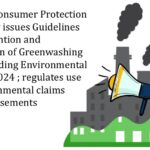The Ministry of Consumer Affairs, Food and Public Distribution (“Ministry”) has published the draft of the Central Consumer Protection Authority (Prevention of Misleading Advertisements and Necessary Due Diligence for Endorsement of Advertisements) Guidelines, 2020, (“Draft Guidelines”)
The Draft Guidelines have been framed with a view to prevent false or misleading advertisements as well as to ensure due diligence to be carried out for endorsements. Views /comments / suggestions on the Draft Guidelines may be e-mailed to dscpu-ca@nic.in by 18th September, 2020.
Applicability:
These guidelines shall be applicable to:
a. manufacturer / service provider whose products / services are the subject of advertising / marketing communications; and
b. advertising agency and endorser (wherever applicable) of the product /service;
Key Compliance Obligations:
Conditions for a valid advertisement:
1. contain truthful and honest representations;
2. not mislead consumers by exaggerating the capability or performance or service of the product;
3. not present rights given to consumers by virtue of law as a distinctive feature of the advertiser’s offer;
4. not suggest that the claims made in it are universally accepted if there is a significant division of informed or scientific opinion pertaining to such claims;
5. not mislead about the nature or extent of the risk to consumers’ personal security, or that of their families if they fail to purchase the advertised product or service;
6. should not be offensive to generally accepted standards of public decency in India and not contain material which is likely to cause grave and widespread offence to the public.
Non-imitation of advertisements:
An advertisement shall not be:
1. similar in general layout, copy, slogans, visual presentation, music or sound effects to other advertisements or promotions so as to be likely to mislead or confuse the consumer.
2. similar to previous advertisements published by any other advertiser in general layout, copy, slogans, visual presentation, music or sound effect so as to mislead or confuse the consumer.
3. Advertisements should not be misleading to the consumers about the manufacturer of the product.
Prohibited advertisements:
1. advertisements likely to incite persons to commit crime and promotes disorder, violence or intolerance are not permitted;
2. advertisements which deride or depicts persons of any race, caste, creed, sex, gender or nationality in an unfavourable manner, then such advertisements shall not be permitted;
3. which affect foreign relations with any other country in an adverse manner;
4. which encourages or propagates the use of products which are banned under any law;
5. which shows, glorifies, or refers to a dangerous practice, or manifests a disregard for safety or encourages negligent behaviour;
Honesty of statements and due diligence to be made by an endorser in relation to advertisements:
1. The endorser of a product or service shall take due care to ensure that all descriptions, claims and comparisons being endorsed or being made in advertisements they appear in are capable of being objectively ascertained and capable of substantiation;
2. endorser for a product or service to take due care to ensure that their endorsement does not convey any express or implied representations that would be false, misleading or deceptive if made by the trader or manufacturer or advertiser of the relevant product or service;
Note: Endorser obtaining advertising advice from an advertising self-regulatory organisation or a legal opinion from an independent legal practitioner regarding the honesty of statements in their endorsement and its compliance with these guidelines and the Act may be considered to have carried out due diligence for the purposes of his liability under the Act.
However, no such advice or opinion may be considered adequate if it is otherwise found that the endorser had knowledge that the endorsement would be false, misleading or deceptive, or that its falsity or misleading or deceptive nature was apparent given the circumstances.
3. Where any endorsement of a product or service represents that the endorser uses the endorsed product, the endorser shall have been a bona fide user of it at the time the endorsement was given;
4. expert endorsement shall be supported by an actual exercise of that expertise in evaluating product features or characteristics with respect to which he is an expert and which are relevant to an ordinary consumer’s use of or experience with the product;
5. In case there is a connection between the endorser and the trader, manufacturer or advertiser of the endorsed product that may materially affect the weight or credibility of the endorsement and if such connection is not reasonably expected by the audience, then the same shall be fully disclosed while making the endorsement.
Source: Ministry of Consumer Affairs, Food and Public Distribution




